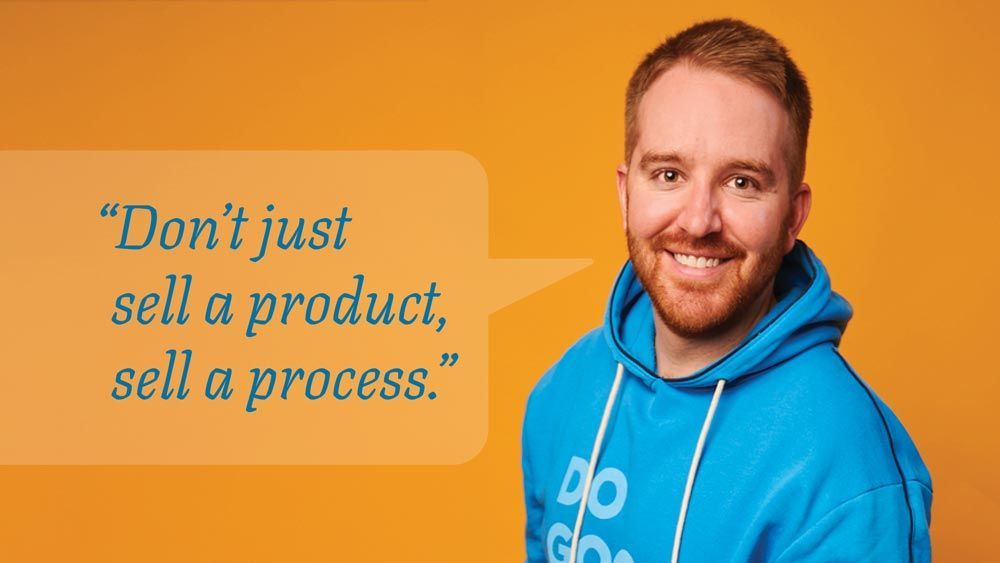Ask These Two Powerful Questions to Understand Your Customers
Do you know what your customers say about your company or brand?
Are you confident that your clients and customers understand what your company stands for and how it helps them solve their problems?
When it comes to your company and your brand, are your customers and clients clear about who you are, what you do, and why it matters to them?
Think of your favorite brand and a product or activity you closely associate with it: Apple and the iPhone. Piaggio and motor scooters. Wyndham and vacations.
- When you see a pair of white earbuds, you identify that individual as a member of a tribe that prefers Apple products.
- When you ride a Piaggio motor scooter, other motorcycle riders signal their kinship with a subtle wave as you pass on the road.
- When you go on vacation at a Wyndham resort, it’s easy to start a conversation with another couple by asking where they are from and if they are owners.
We find community and shared purpose through the beliefs, values, and guiding principles that are part of our shared identity. We express our personality through symbols and signals, so it’s easy for us to identify each other based on whom we say we are.
We assume that the signals we send and the symbols we wear represent the best of us, our shared values, and the characteristics of our “brand.”
Two Powerful Questions You Must Ask Your Customers
Reflecting on my experience after a trip to Israel, I can’t help but notice that the questions Jesus asks his followers can give us insight into strategy and business.
Two questions he asked are the same two insightful brand research questions you should be asking your customers, and asking your team to help you understand how to express your brand and understand what the market perceives.
Jesus chose to ask two questions in a conversation near Caesarea Philippi (An area located in the northern part of Israel, by Mount Hermon and the Jordan River), where people used to worship the Greek god, Pan.
He wanted to know, “Is the message about me rising above the noise of competing messages about false gods?”
You can ask the same question of your brand and business: “Is the message about my brand breaking through the competing messages from our competitors in the marketplace?”
First, Jesus asked his followers, “Who do people say I am?”
You should be asking your team similar questions:
- “ What do our customers say about our company? ”
- “What do prospective customers say about our company?”
- “What does the marketplace say about our company?”
These questions will quickly reveal to you if people understand three key points:
- What people think your company does,
- How you help them solve their problems, and
- Why they should do business with you.
To communicate your company’s purpose with clarity, you must to be listening to the story people tell themselves about your company.
When you ask customers these questions and listen intently to what they say (not for what you want to hear), the answers will help you do two things:
- Understand if your go-to-market message and services align with the problems your customers need help solving
- Evaluate how your brand messaging and customer experience must adapt to change their misperceptions and reinforce your business and growth strategy
When you ask these questions, people know you're interested in what they think and feel respected when their voice matters. What customer doesn’t love a brand that listens to their needs?
Next, Jesus asked Peter (one of his leading followers), “Who do you say I am?”
The disciples were with Jesus every day. If Jesus’ disciples were not on the same page and if they were not clear on who he was and why he mattered, how could they follow him?
Your employees and team are with you every day. Does what they understand and believe about your company align with its mission, the leadership, and the brand identity the company projects to customers?
If your team, message, and marketing aren’t all on the same page, how will your customers know if your company and brand is the right fit for them?
How will they be clear about who you are and why they want to work for or buy from you?
Like your customers, everyone in your business must know the same three key points that you want your customers to believe:
- What your company does,
- How you help customers solve their problems, and
- Why customers should do business with you.
- Jesus was checking with his closest circle of followers (his team) to learn what they were hearing from the people. He needed to know if his team understood who he was and why he mattered.
This model of leadership is easy for you to practice: Jesus expected his followers to listen to the people, and he listened to his team. This example is a powerful model of leadership in marketing.
You should listen to
your team, and expect your team to listen to your customers.
When you expect the same from your team, you create unity and alignment in your
culture and communications. Listen to your customers and the people that serve them. Ask what they think, measure their perceptions of your brand character, and avoid wasting time and money trying to sell products and services for problems people don’t have.
When you ask the same questions Jesus asked, you can be confident your brand and messaging will connect with your customers.
Do you have a hard time explaining what your company does or why your brand matters to people?
If you struggle to grow your business, you’re not alone. Aespire can help you create a clear message and brand that helps you grow your business. Contact us today for a consultation with a StoryBrand Certified Marketing Guide.
Get a Free Comprehensive Marketing Assessment
Stop hoping your marketing will sort itself out.
- Complete this free assessment in 15 minutes.
- Review your custom report (and schedule a 30-minute review) to diagnose what’s happening.
- Create an action plan to get your marketing back on track.







